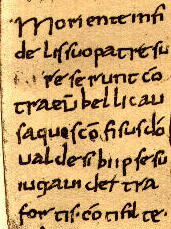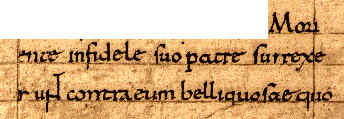MSS.
Florence Libri 3

Moriente infi
delis suo patre su
reserunt con
tra eum bellicau
sa quos confisus Deo
valde sibi ipse su
iugaui dextra
fortis. Conti filte.
Clermont-Ferrand 3

Mori
ente infidele suo patre surrexe
runt contra eum belliquosae quo

confisus deo ualde sibi ipse subiu
gavit dextra forte cuncti flete pro.
EDITIONS
Lair
Moriente infideles suo patre
Surrexerunt contra eum bellicose;
Quos, confisus Deo valde, sibi ipse
Subjugavit dextra forte.
Cuncti flete...
Lauer
Moriente infidelis suo patre
surrexerunt contra eum belliquose,
quos confisus Deo valde sibi ipse
subjugavit dextra forte.
Cuncti flete...
Becker
Moriente infideles suo patre
surrexerunt contra eum bellicose:
quos, confisus Deo valde, sibi ipse
subjugavit manu forte.
Cuncti flete pro Willelmo innocente interfecto.
TRANSLATIONS
Becker
Als sein Vater starb, erhoben sich die Nichtgläubigen
in kriegerischer Absicht gegen ihn; er aber, fest auf Gott vertrauend,
unterwarf sie sich selber mit starker Hand.
Albrectsen
Da hans fader bort fra livet måtte vandre,
troløst mænd stod op i kamp mod ynglingsønnen,
men i tro på Gud urokkeligt forankret
han dem fældede med sværdet.
Græd nu alle...
Van Houts
After the death of his father,
the pagans rose in war against him;
firmly trusting in God
he subdued them with a strong force.
Shed tears for William
who died innocently
Lifshitz
When his father died, faithless ones rose up in arms against
him, and he subjugated them to himself with a strong right hand,
mightily strengthened by God. All lament for William.
Helmerichs
With his father dying the infidels,
warlike, rose up against him:
trusting completely in God, he
subjugated them to himself with his strong right hand.
All weep for innocent, slain William.
COMMENTARIES
Steenstrup
See the extensive commentary on this verse and the previous
one in Johannes Steenstrup,
“Dissertation sur la Complainte de Guillaume Longue-Épée
et les critiques dont elle a été l'objet,” in
Étude
sur la vie et la mort de Guillaume Longue-épée,
duc de Normandie,
by Jules Lair (Paris: Picard, 1893), 71-77.